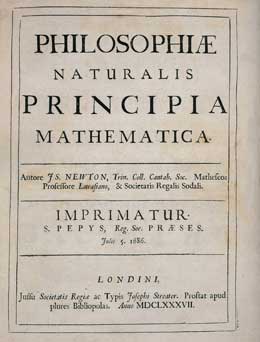Highlights

NEWTON, Isaac (1643-1727)
Philosophiea naturalis principia mathematica
London: Joseph Streater for the Royal Society (at the expense of Edmond Halley); 1687
 F
F
irst edition, a cornerstone treatise on dynamics and gravitation and the most influential scientific publication of the seventeenth century. Fundamentally the Principia explains the phenomena described by Newton's predecessors (Copernicus, Galilei, Kepler) by elucidating the universal laws underlying them.
At the urging of Edmond Halley, secretary to the Royal Society, Newton set about to prove that Kepler's law of planetary motion would cause a planet to orbit elliptically around the sun. Newton established the mathematical bases for the law of inertia and the mechanics of fluids, including the effect of bodies moving through resistant fluids (i.e., friction).
Further, Newton's law of universal gravitation proved the physical unity of the cosmos: Newton demonstrated that the important and dramatic aspects of nature from dust particles to the moon in its orbit to tidal waves and the blaze of a comet were subject to the universal law of gravitation, and could be explained, in mathematical terms, within a single physical theory.
Newton's Principia explained a system of the universe that, once established, was unchallenged until the twentieth century ushered in quantum theory and the theories of relativity - Einstein described Principia as "perhaps the greatest intellectual stride that it has ever been granted to any man to make:" The difficulty of its subject and the influence of earlier theories somewhat delayed general acceptance of Newton's systems, although his mathematical explanations of gravity and motion would eventually change man's understanding of the universe.

